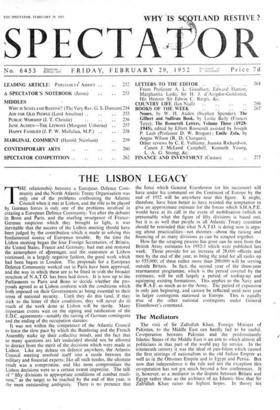THE LISBON LEGACY
HE relationship between a European Defence Com- munity and the North Atlantic Treaty Organisation was only one of the problems confronting the Atlantic Council when it met at Lisbon, and the role to be played by German forces is only one of the problems involved in creating a European Defence Community. Yet after the debates in Bonn and Paris, and the snarling resurgence of Franco- German suspicion which they brought to light, it was inevitable that the success of the Lisbon meeting should have beenjudged by the contribution which it made to solving this fundamental source of European trouble. By the time the Lisbon meeting began the four Foreign Secretaries, of Britain, the United States, France and Germany, had met and restored the atmosphere of atreenront, and the statesmen at Lisbon continued, in a largely negative fashion, the good work which had been -begun in London. The proposals for a European Defence.Community worked out in Paris have been approved, and the way in which these are to be fitted in with the broader structure of N.A.T.O. has been laid down. It is now up to the Parliaments in Paris and Bonn to decide whether the pro- posals agreed to at Lisbon conform with the conditions which both imposed on their Governments as being essential to their sense of national security. Until they do this (and, if they stick to the letter. of their conditions, they will never do it) much of the work done at Lisbon will be sterile. Many important events wait on the signing and ratification of the E.D.C. agreements—notably the raising of German contingents and the ending of the occupation statutes. It was not within the competence of the Atlantic Council to force the slow pace by which the Bundestag and the French Assembly- make up their collective minds, and the fact that so many questions are left undecided should not be allowed to detract from the merit of the decisions which were made at Lisbon. Like any debate on defence anywhere, the Atlantic Council meeting resolved itself into a tussle between the military and financial experts; like all such tussles, the ultimate result was- a compromise, and like most compromises the Lisbon decisions were to a certain extent imprecise. The talk of "fifty divisions in appropriate conditions of combat readi- ness," as the target to be reached by the end of this year, is the most outstanding ambiguity. There is no pretence that the force which General Eisenhower (or his successor) will have under his command on the Continent of Europe by the end of 1952 will be anywhere near this figure. It might, therefore, have been better to have resisted the temptation to give an approximate estimate for the forces which S.H.A.P.E. would have at its call in the event of mobilisation (which is presumably what the figure of fifty divisions is based on); but it is as well that people in all Atlantic Treaty countries should be reminded that what N.A.T.O. is doing now is argu- ing about practicalities—not theories—about the raising and financing of as many divisions as can be scraped together.
How far the scraping process has gone can be seen from the British Army estimates for 1952-3 which were published last week. These provide for an increase of 28,000 officers and men by the end of the year, to bring the total for all ranks up to 555,000; of these rather more than 200.000 will be serving outside Britain. In fact, the second year of the three-year rearmament programme, which is the period covered by the estimates, will be still largely a period of tooling-up and equipping existing formations. This applies to the Navy and the R.A.F. as much as to the Army. The period of expansion is only just beginning, and cannot be reflected until next year in larger contingents stationed in Europe. This is equally true of the other national contingents under General Eisenhower's command.


































